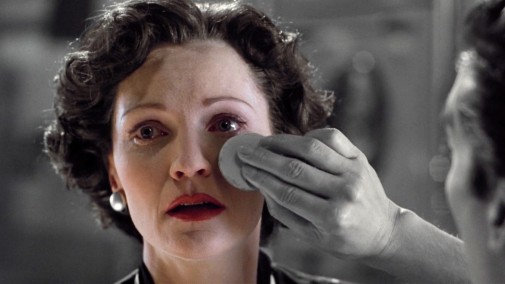
You guys really love Joan Allen. Once again, this three-time Academy Award nominee has won the readers' vote in the Almost There polls. When choosing from a selection of 10 non-Oscar-nominated performances in new to streaming movies, you picked Allen's turn in Gary Ross' Pleasantville. It's a 1998 fantasy about two modern teenagers who find themselves teleported inside a 1950s black-and-white sitcom. As their influence humanizes the neighborhood, sexual autonomy blossoms as do other desires, wills. Even color starts to appear in the monochrome universe. Odious prejudice is soon to follow.
Between metaphors about sexual liberation, racism, and midcentury conservativism, one cast member shines brighter than all the others, rises above the picture's relative shortcomings. As the kids' televisual mother, Joan Allen is a miracle of stilted cheeriness melting into delicate gradations of humanity…

Have you ever noticed how different smiles can be? A relaxed face with slightly upturned lips can be a signifier of many emotions, from subdued joy to rueful reminiscence, even regret. Smile with tears in your eyes and you'll sing a silent song of conflicting sentiment, be it joy so intense it makes you cry or the resilience of someone trying to project glee through a cloud of despondence. Those are all quite natural expressions, though. If the smile is too wide, the facial muscles too tense and exaggerated, you arrive at something uncanny, manic, frighteningly wrong.
All this talk of smiles serves as an introduction to Joan Allen's Betty, a performance whose arc can be tracked by the variation in grins. She's an Eisenhower-era housewife who floats through the house in her cupcake-like skirts. A domestic fairy soaring through her wholesome kingdom, Betty's studied elegance only breaks when she looks at the camera to punctuate humorless punchlines. It's a regimental existence, delineated by clichéd scripts and the tired mechanisms of classic sitcoms, repetitive rhythms, vacuous plots, stylized language that presents an idealized facsimile of suburban life.

Fittingly, when Betty smiles, the expression is like a mask hiding a personality void. She shows her teeth, eyebrows lifting in absurdist cheer, her cheeks so flexed that Allen's face looks temporarily paralyzed. It's easy to miss the early extremes of the performance or to dismiss them as shallow mugging. The actress, kept at the margins of the action in her initial scenes, is establishing the parameters of artifice that will unravel as her character grows. Noticeably, the iceberg of Betty's picture-perfect unreality begins to thaw the moment she greets someone with anything other than an empty excessive smile.

Seeing Jeff Daniels' Mr. Johnson, the owner of the local soda fountain, Betty's face betrays a glimmer of curiosity, a seedling of inner life that soon blooms into a flower of self-discovery. Later, as she inquires her daughter about the nature of sex, other variations of expression immerge. Pointedly, Betty twinkles with a shy demureness that indicates she wants to know more. She's not negatively shocked, though her social prerogatives may demand such reactions. Instead, she's full of trepidation, ready to venture into the unknown and experience her first orgasm, finding pure pleasure instead of shallow pleasentness. That last experience is so extraordinary, it literally starts a fire.

From then on, Allen's Betty keeps expanding her repertoire of expression, her collection of smiles increasing tenfold with each passing day, each personal discovery. The aftermath of the fie brings a shiny medal to her son and a wistful, distracted sort of grin to Betty's face. Technicolor shades quickly erupt, painting her skin in rosy tones, her lips read, her hair chestnut. Ashamed and insecure, she smiles through tears and has her boy paint her into grayscale, hiding her real self with cosmetic illusion. However, the audience can see that Betty is a different woman. Her smiles are no longer devoid of feeling, no longer robotic.

While one may harp on about Allen's many smiles, her entire body goes through a gradual transformation, losing its initial stiffness but also the mechanic elegance of Betty's domestic fairy schtick. In many ways, the actress is tracing an evolution in performance style, going from an idealized overt artifice to something messier, closer to the reality of being human in the world outside the television screen. It's revelatory work that only becomes more beautiful when Betty starts to truly assert her will, looking for genuine love and refusing placid conformity.

Allen's chemistry with Daniels is sublime, her smiles again mutating, becoming more genuine but also smaller. At the same time, there's a newfound sternness about Betty, the strength of her conviction turning her gaze into steel, her back into a ramrod line of righteousness. When we get to Betty's final confrontation with her husband, Joan Allen delivers the line "I don't want it to go away" with such desperate sincerity we can't help but cheer for the woman's resolve. Only after the painful process of liberation can true happiness be found, after the scalding touch of hate and the dissolution of unfulfilling matrimony. Only after that does Betty get to smile with true unbridled joy, a mother's pride, a lover's jubilation. It's a sight to behold, beautiful and overwhelming.
With all that said, you can surmise that I think this is a performance worthy of a great many gold accolades. Oscar-wise, Joan Allen did get some precursor attention in the form of critics' honors. She won the Best Supporting Actress prize from the BSFC, DFWFCA, LAFCA, SEFCA, and tied with Kathy Bates in Primary Colors for the Critics Choice Award. Unfortunately, that wasn't enough for AMPAS who nominated the aforementioned Bates, Rachel Griffiths in Hilary & Jackie, Judi Dench in Shakespeare in Love, Brenda Blethyn in Little Voice, and Lynn Redgrave in Gods & Monsters. Pleasantville still got three nods, but none of them were for its best element, the fantastic Oscar-worthy performance of Joan Allen.

Pleasantville is streaming on HBO Max. You can also rent it from most services.